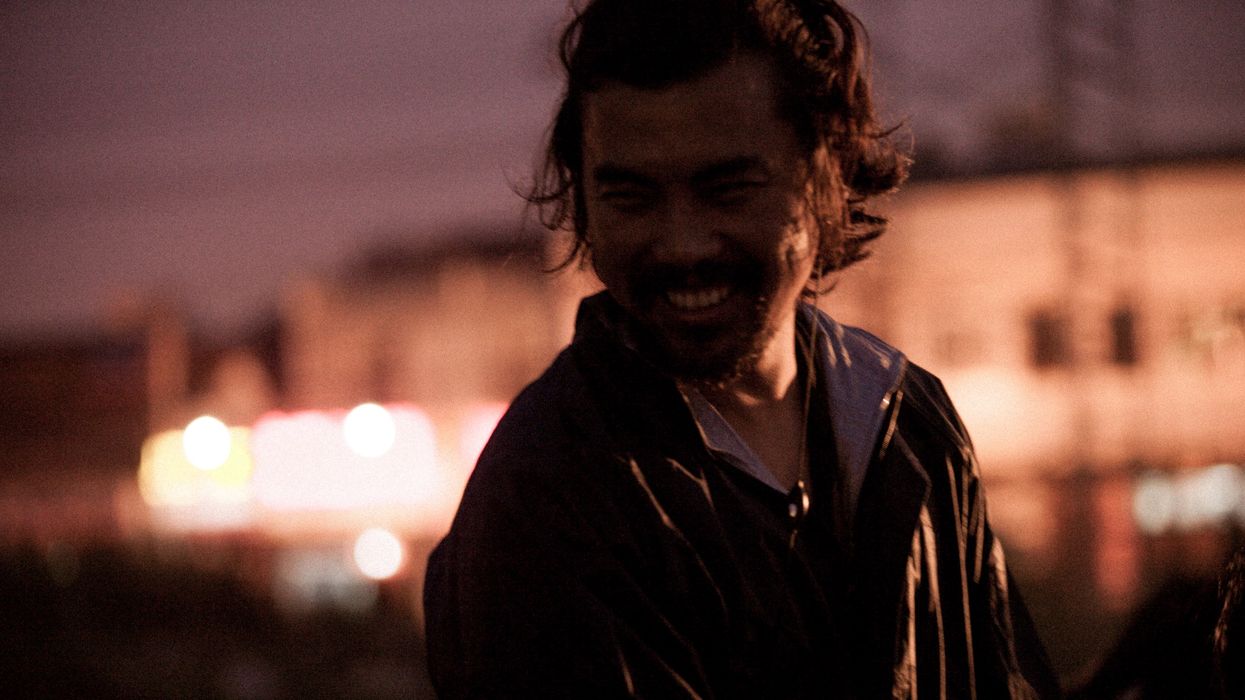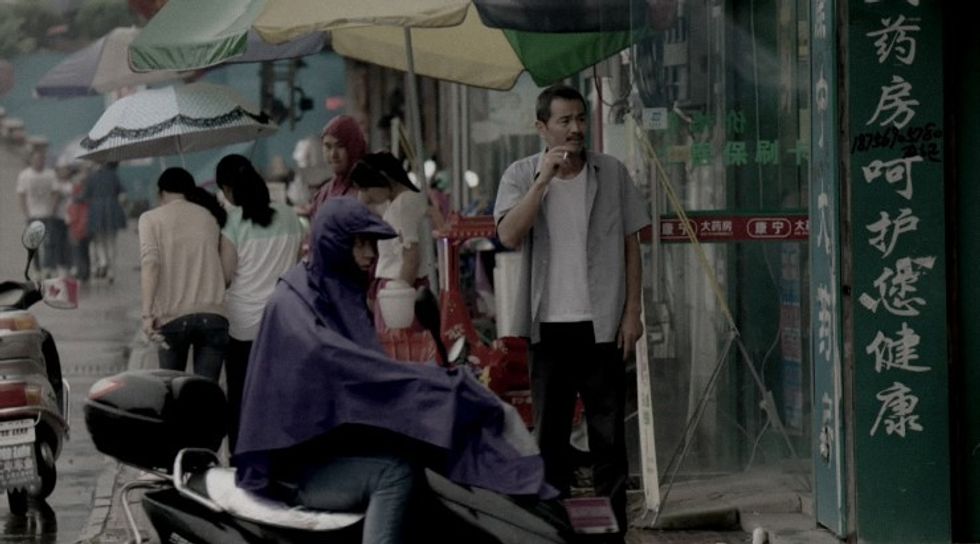Indie China: Johnny Ma on the Challenge of Making Indie Films in the People's Republic
Making an independent film in China is a daunting task for any filmmaker, let alone a first-timer. But Johnny Ma accepted the challenge for his slow-burning dramatic thriller about the cost of doing the right thing in modern society.

Lao Shi (Old Stone) had its world premiere in the Forum track in this year’s Berlinale. It is the debut feature for Ma, who was born in Shanghai, raised in Canada, and went to college in New York. Before entering film he worked as a financial consultant and in the fashion industry. (He also attended the Sundance Labs with NFS founder Ryan Koo.)
Ma’s film steeps itself in Chinese culture while regarding it with a critical eye. After striking a passenger in an accident, a small-town taxi driver (Chen Gang) rushes him to the hospital rather than wait for the ambulance. As punishment for his good deed, he is stuck paying for the victim’s medical bills while he spirals ever-deeper into a bureaucratic nightmare of insurance policies.
NFS chatted with Ma during a Berlinale party (thrown by the Shanghai International Film Festival, funny enough) about dealing with censors, shooting in crowded streets, and why “indie film” is a dirty word in China.
[This conversation has been edited for clarity.]
NFS: How do you feel your mix of backgrounds informed your approach to this story?
Ma: I feel it both helps and maybe takes away from it, but in the end it just creates a mesh of something hopefully interesting. I’m always trying to tell a story so that it doesn’t look like poverty porn, that it feels honest. That’s number one. I always do much more homework than other filmmakers do. So for this film, I lived in that region for about four months before we shot. My producer is from that town, so I felt like I would just eat with real people all day, just hang out with them all day long, so that I could at least know what it would be like to actually live in that town as an individual. But I think as an outsider you can always see the hypocrisy a little easier than the folks who have been living in that regime for a long time -- it’s actually quite expensive in that city, so our budget wasn’t as cheap as we thought it would be.
NFS: Did you always know you wanted to make your first feature film in China?
Ma: Yeah. I shot my thesis short film in China and I kind of knew that if that film succeeded, it would take me on a path where it would lead to a potential feature film in China. Certainly I didn’t mind making a film in China -- I loved the idea -- but I’ve made [short] films in Australia, in Brazil, in different countries, so it was never a problem for me to shoot in different places. But I just always felt that if I was going to be able to tell an honest story in every other country or city, then I really should try to do it in my home -- and even though I’d been away for a very long time, I wanted to tell it in an honest way.
NFS: Were you able to line up the Chinese financiers before you started shooting?
Ma: I went to China with my Sundance [screenplay] project, and with the momentum of that I started meeting investors. I started realizing very quickly that that kind of film was just not very interesting for the investors at all. So nobody wanted to be a part of it. Then I thought about this story, Lao Shi, and probably if there was no influence in terms of the Chinese market, I would have just done the story like the first act [social-realist drama]. But then it felt interesting, and also a necessity, to give the investors something where they could feel like there was some market value to it, which was the thriller element.
I had never really seen a film that had meshed those two genres that well. I took it on as something I’d never done before, which would be a challenging thing to do, and I’m not sure if we hit it, but I’m glad that that’s part of the film. Especially now, when I watch it with an audience, I’m like, “Oh, you’re enjoying it now, just wait -- more shit’s going to come.” Most people, if they really love the first act, they have a tough time to take the leap of faith because they think it’s too much.
There was a film that won [the Golden Bear] at Berlin a couple years ago called Black Coal, Thin Ice -- it’s a fantastic film. And this kind of film hadn’t been done in China before. And it was deemed a success, because it was an art-house film that won Berlin. And it came and had a domestic release, and apparently it was popular. It opened up a new market -- there’s another type of film that [Chinese] audiences might be able to accept. So I couldn’t say, “Oh, it will be an art-house film, social document, neo-realism.” They wouldn’t see that. But if I say, “Oh, it’s like Black Coal, Thin Ice,” then maybe.
Unfortunately, Chinese producers sometimes aren’t any different from Hollywood producers. They need some help to visualize what this film could be, to have these references.
NFS: How did you work with the Chinese censors for the actual content of the film?
Ma: It’s very complicated. It’s a process that has nothing to do with the actual filmmaking part of it. It’s something extra that you really, as a filmmaker, shouldn’t have to deal with. But you do have to deal with it as a Chinese filmmaker, because -- and this is a problem -- the censorship board, the actual rule is very, very muddy. You can’t tell what it is. But you know historically, that if you do [certain things], you can’t make it past them. So what you end up actually doing is self-censoring, before they even get [the treatment]. And that’s why [in] the Chinese market now, there’s unfortunately not a lot of very good films, because they’re so afraid of not getting a domestic distribution, so even in the writing process they start to write very safely.
Luckily we had people who were like, “Just do what you want to do, and we’ll figure out the rest later.” So I was able to write it the way I wanted it. But when we sent it to the censorship board, we had to be very strategic in terms of our treatments, not to reveal everything in the story. Just in case. We were confident, but we didn’t want to have problems.
It actually took about three months for us to get the stamp of approval to allow us to film. And imagine, everything is ready, [but] the money can’t come if there’s no passing the censorship board. So everything was waiting for the bureaucrats, to get this piece of paper.
NFS: For the uninitiated, what elements of your film’s story would they see as inappropriate?
Ma: It’s the little things. It’s like the cigarette gimmick, the small-time bribery stuff. [Characters frequently offer cigarettes to government officials in the hopes of speeding up paperwork.] Because it makes the cops, the authorities, look -- not even corrupt, just a little dodgy. And even things like, if you swear too vilely. For example, “Fuck you, motherfucker,” could be taken out.
NFS: What about critiquing the Communist Party?
Ma: Oh yeah, the authority is the Communist Party. So you definitely want to be careful. I didn’t want to make a film that was criticizing the Chinese government. That’s just a cheap shot, I feel. It’s too easy to do that. I don’t want to put my producers and myself in trouble for no reason at all. I have something that I wanted to say about what we as human beings are moving towards, and China is the country that’s moving the fastest. And the people are not catching up. So there’s this crazy disconnect between this sensitivity of traditions and the new way of thinking, which is all about dollar signs.
"'Independent film' is such an ugly word in China that you’re like a leper or something."
NFS: Do you think your Western-educated background affected your communications with the film team?
Ma: I’ve seen some Chinese directors direct, and they treat their entire crew like an army -- they’re the general. So even when they call, “Action!,” they’re really yelling it. While on my set, I’m very quiet. I walk in and I whisper in people’s ears. This is what you’re taught by Western directors; you talk to them privately. But in China, everything’s so open. If I take somebody aside, I actually have actors tell me, “Hey, don’t do that, because if you do that to somebody else I’m going to think you’re trying to tell him that I’m not good.” They think that there’s something dodgy going on. So they ask me if I can just speak to them openly, with the crew around. They say, “Hey, we’re all trying to make something good, so let’s just all talk it out.”
NFS: Was it an all-Chinese crew?
Ma: Yeah, absolutely. I wanted to make the film as truthfully as possible. We were putting our actors and our crew in the middle of real life [they shot crowd scenes in actual crowds]. If you have too many foreigners on your set, it distracts from what’s really important -- the foreigners become the spectacle in small towns like that.
The opening scene of the accident, we shot in traffic hours. We basically planted an accident that looks like a real accident, and we had five, six people standing around. And in China, once you have six people standing around, 20, 30 people come. We made sure that our actors were yelling out the key things, to try to get the crowd going.
NFS: Is China standing behind the film now?
Ma: My [Chinese] producer wants to do interesting things, but no one around him supports him. “Independent film” is such an ugly word in China that you’re like a leper or something. So it’s really difficult when you’re the only person who wants to do something like that.
NFS: Do you see yourself staying in China for future films?
Ma: I would say, at least for the next film, I would make it in China -- I would love to be like a Wim Wenders, a filmmaker of the world who can go everywhere and do something honest. I don’t want to just be a Chinese filmmaker or a Canadian filmmaker. I want to be a part of a generation of filmmakers that I think we don’t really have a name for yet.
Thanks, Johnny!
To learn more about Lao Shi (Old Stone), check out the film's profile on the Berlin Film Festival website.
Be sure to check back for more coverage of Berlinale 2016.


 "'Back Home"via Mercedes Arutro
"'Back Home"via Mercedes Arutro 'Back Home'via Mercedes Arutro
'Back Home'via Mercedes Arutro 









